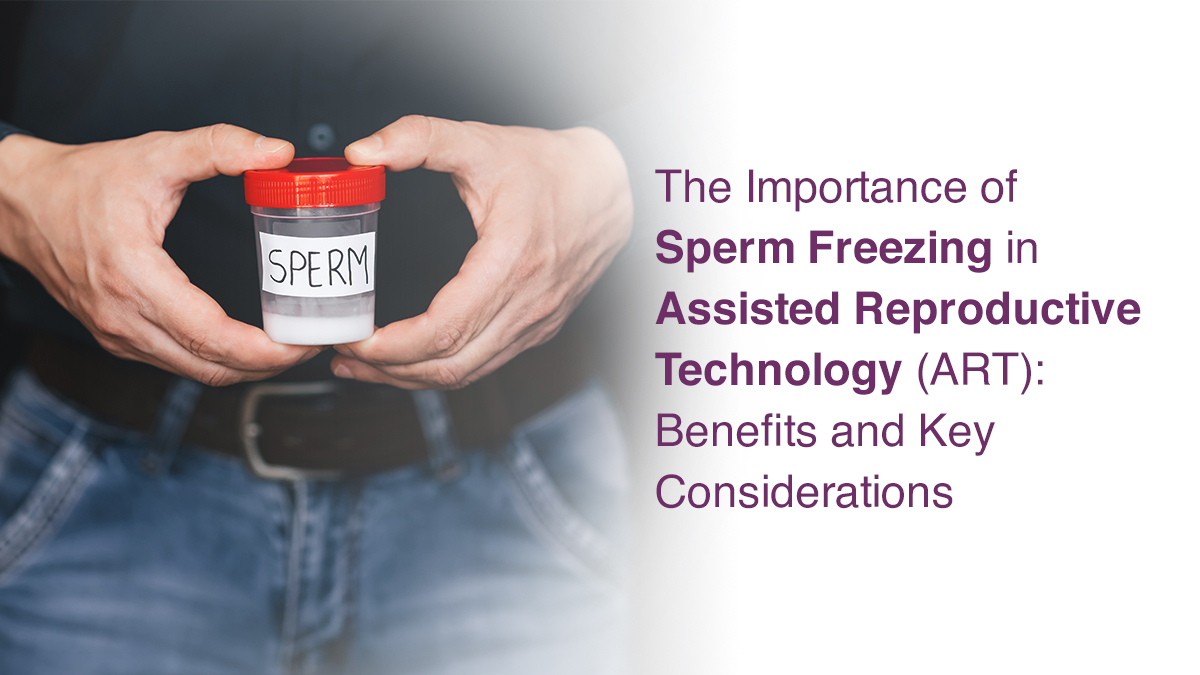Male infertility may occur if a man produces insufficient or poor-quality sperm. Sperm motility, count and DNA quality all decrease with age in men, making fertilisation more difficult and raising the possibility of genetic abnormalities. A remedy is offered via sperm freezing, which enables men to maintain viable sperm before increasing age or other causes result in declining fertility. This procedure lowers the risks of diminishing fertility and promotes successful conception later in life by ensuring that viable sperm is available for use in the future.
What is Sperm Freezing?
Sperm freezing is used for numerous medical and personal reasons, such as low sperm counts, military deployments, and upcoming cancer treatments that may impair fertility. It entails gathering and preserving semen samples in liquid nitrogen at -196°C. It encompasses sperm collection, analysis and storage. Men receiving treatments like chemotherapy, radiation therapy, or specific operations that may affect their ability to conceive can benefit from this technique. It also benefits males who work in jobs that could expose them to dangerous conditions, those who want to put off having children, and those who have genetic conditions that could impair fertility.
Benefits of Sperm Freezing in ART
Preservation of Fertility
Men can preserve their fertility by freezing their sperm before enduring procedures like chemotherapy, radiation therapy, or surgery that could affect their ability to conceive.
Increased Success in ART
The chances of a successful conception can be increased by using frozen sperm in assisted reproductive technologies (ART) such as IVF or ICSI, particularly for men with low sperm counts or poor sperm quality.
Flexibility for Delayed Parenthood
By guaranteeing better sperm for future use, sperm banking gives men the opportunity to become fathers later in life when their natural fertility may have decreased.
Convenience During Infertility Treatments
Sperm freezing guarantees that sperm samples will be available for reproductive operations when needed, especially when stress or worry may impair sample production on the day of treatment.
Safe Option for High-Risk Occupations
If accidents or occupational hazards lead to infertility in the future, men in high-risk occupations (such as military, construction or radiation) can safeguard their fertility with sperm banking.
Backup for Unavailability
If the male spouse is unwilling or unavailable to supply a sample during reproductive treatments, sperm banking provides a dependable fallback.
Treatment for Poor-Quality Semen
By concentrating and pooling low-quality sperm samples, sperm freezing enables fertility professionals to increase the likelihood of successful fertilisation using ART techniques.
Key Considerations for Sperm Freezing
Timing of Collection
Prior to undertaking surgeries or treatments that may impact fertility, such as radiation, chemotherapy, or surgery, sperm freezing should be performed. High-quality sperm are more likely to be preserved when collected early.
Sperm Quality
Sperm quality at the time of collection is very important. It’s critical to assess sperm quality before freezing because variables like sperm count, motility, and morphology affect the outcome of subsequent fertility treatments.
Storage Duration
Although sperm can be kept for extended periods of time, their quality may progressively deteriorate. To guarantee viability for future usage, talk to a fertility professional about the anticipated sperm storage period.
Cost of Sperm Freezing – h3
Sperm banking can be expensive, particularly if you have to pay for long-term storage. Think about the expenses associated with preserving and freezing sperm.
Legal and Ethical Considerations
Recognise your legal rights and obligations with regard to stored sperm, particularly with regard to ownership, utilisation and consent. For males who are single or unmarried, this is especially crucial.
Fertility Success Rates
Although sperm freezing provides a fallback alternative, success rates can differ depending on the ART method, storage duration, and sperm quality. To set reasonable expectations, speak with a fertility specialist.
Health and Lifestyle Factors
Sperm quality can be impacted by a number of lifestyle choices, including diet, alcohol consumption, and smoking. Sperm harvested for freezing can be of higher quality if one maintains a healthy lifestyle.
Emotional and Psychological Impact
Think about the psychological and emotional effects of freezing sperm, particularly if it’s being done because of medical procedures or worries about future fertility.
Who Should Consider Sperm Freezing?
Men who are having surgery, a vasectomy or cancer treatment can decide to freeze their sperm because these procedures can impact fertility. People who intend to have children later in life or who are dealing with health issues that affect sperm quality, such as low motility or count, should also consider it. To ensure their reproductive health is not endangered due to accidents or exposure, men in high-risk occupations (like radiation, construction, or military) can save their sperm. Sperm collection can be a method for people with low-quality semen to undergo ART treatments without being deterred. Thus, candidates for sperm freezing are not only those men who have genetic risks or whose partners are not available during the fertility therapy cycle, but also men who have been previously diagnosed with these disorders should consider sperm freezing.
Steps to Freeze Sperm
How to freeze sperm? Here’s a step-by-step process for sperm cryopreservation:
- Consult a fertility expert to learn more about the freezing procedure and assess the quality of your sperm.
- At the fertility clinic, provide a sample of semen, usually by masturbating.
- To evaluate quality, the sperm count, motility, and morphology of the sample are examined. This is an important step in the sperm freezing process.
- Sperm are treated and diluted with a cryoprotectant to guard against freezing-related damage.
- The sperm are kept in liquid nitrogen at below-freezing temperatures and frozen in specialised containers.
- For later usage, the frozen sperm is kept in a sperm bank under constant observation.
- Fill out legal and consent paperwork pertaining to usage and storage length.
Conclusion
Sperm freezing is an incredible technique in modern reproductive medicine, providing hope and alternatives to men facing fertility challenges. You can visit your nearest Oasis Fertility to discuss treatment options with our fertility specialists. Avail more details by calling 1800-3001-1000 or engaging in a discussion via our live chat facility.

